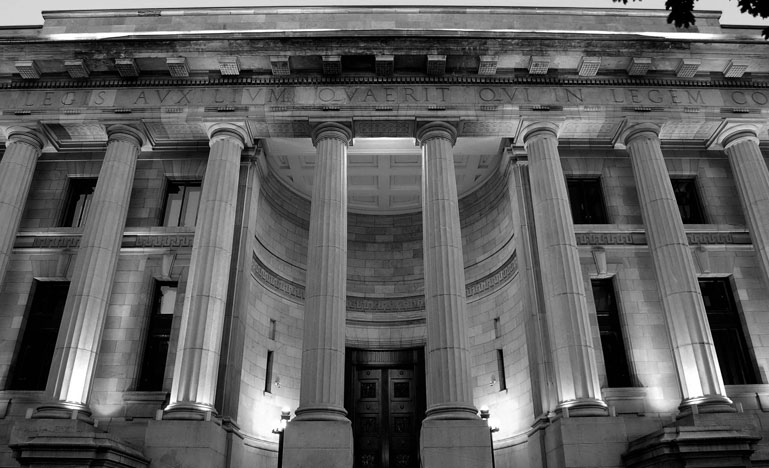On April 20, Justice Marc-André Blanchard of the Superior Court of Québec delivered a ruling that perfectly illustrates the complexities of our constitutional system. Basically everyone found something to criticize about it.
This ruling on the constitutionality of Quebec's secularism law, Bill 21, has upset everyone, except perhaps current and future employees and administrators of Quebec’s English-language school boards. They've been declared exempt from the provisions of the act. In a decision spanning more than 200 pages, Justice Blanchard held that Bill 21 must not violate section 23 of the Canadian Charter of Rights and Freedoms, which protects the right to minority-language education.
Patrick Taillon, a constitutional scholar based at Université Laval, called this a partial victory for opponents of the law. Section 23 is outside the scope of the notwithstanding clause. Quebec's government invoked section 33 of the Charter to protect Bill 21 from being declared invalid given that, by its very nature, it infringes on the freedom of religion guaranteed by section 2. The notwithstanding clause can only apply to section 2 and sections 7 to 15 of the Charter. This is also why the law cannot be applied to elected members of the National Assembly, whose independence is protected by section 3 of the Charter.
“We are far from the question of weak or strong neutrality that must be imposed on representatives of the State, or the freedom of representatives of the State to express their convictions. The reasoning used here comes from a decision in a case called Mahe, which dealt with matters outside of Quebec, and which ruled that the right to receive minority language instruction also entails the right to a certain amount of autonomy in managing the schools that provide this instruction,” says Taillon, who has previously authored a comparative study on secularism for the Attorney General of Québec. “The court is saying that the right to have schools is also the right to control what happens in those schools.”
The Quebec government was quick to announce that it will appeal the ruling, which it called illogical, to overturn this exception. “At the moment, it’s as if secularism and our values apply differently to Anglophones and Francophones,” said Premier François Legault, adding on his Twitter account that for him, “secularism and the shared values of Quebec have no language barrier.”
For Taillon, Justice Blanchard’s approach in this regard is “quite classic in terms of rights and freedoms. Our judges never want to define the precise scope of a particular right, because their approach is very context-based. They want to allow these rights to reach their full potential depending on the circumstances,” he explained. Taillon also considers the ruling to be consistent with section 23.
For opponents of the law, like lawyer Nour El-Sabah Farhat, there is reason to hope that the decision carries the seeds of a reversal on appeal.
“The ruling presents several important and eloquent conclusions about the extent to which Charter rights and freedoms are suspended by the Act,” she said, noting that it also offers conclusions on the discriminatory nature of the law and its effects, in particular for Muslim women. “The judge recognizes that Bill 21 has significant inhibiting effects and impinges heavily on the right to freedom of conscience and religion.”
In 2020, El-Sabah Farhat supported a resolution at the CBA’s Annual General Meeting to condemn any law that uses religion to deny people equal opportunity to enter the legal profession.
Sherbrooke University constitutional scholar Maxime St-Hilaire said he was relieved that Justice Blanchard did not take the opportunity to overturn the principle of the Ford decision regarding the application of the notwithstanding clause, although St-Hilaire felt the judge could have been firmer. “The principle of the Ford decision on section 33 only allows for a formal review, not a substantive review. We just check that the formal conditions are met—we don’t look too closely at whether or not there is a declaration. The only thing that doesn’t work is the retrospective override, but otherwise we’re not that careful. It just takes a declaration from the legislator.”
For St-Hilaire, there's no doubt that, contrary to what many experts think, one of the arguments that gave the judge the most trouble was the division of powers.
In a 2019 article for CBA National magazine (available in French only), St-Hilaire retraced the series of rulings confirming that in Canada, religious laws that restrict rights fall within the exclusive jurisdiction of the federal legislature. In his decision, Justice Blanchard spends dozens of pages addressing this argument. There is no doubt that Bill 21 is, by its very nature, a rights-restricting religious law. Therefore, in principle, it should be declared ultra vires of the jurisdiction of the provincial government.
St-Hilaire described Justice Blanchard’s conclusion as a “sleight of hand.” The ruling concludes that, given the absence of criminal sanctions in Bill 21 for wearing religious symbols, the law cannot fall within the jurisdiction of criminal law, and instead falls within provincial jurisdiction, linking it to various provincial jurisdictions including matters of a merely local or private nature in the province, pursuant to section 92(16) of the Constitution Act, 1867. Whereas, in St-Hilaire’s view, it should instead fall under residual federal jurisdiction. “If a law is ultra vires of a province, then it must be under federal jurisdiction,” he said.
Finally, some observers, including University of New Brunswick professor Kerri Froc, are disappointed with Justice Blanchard’s decision when it comes to Bill 21’s infringement on the right to gender equality guaranteed by section 28 of the Charter, which the ruling characterized as an interpretive provision. According to Froc, this is an inaccurate view. “I hope it will be corrected on appeal,” she said.
To be continued, then.



